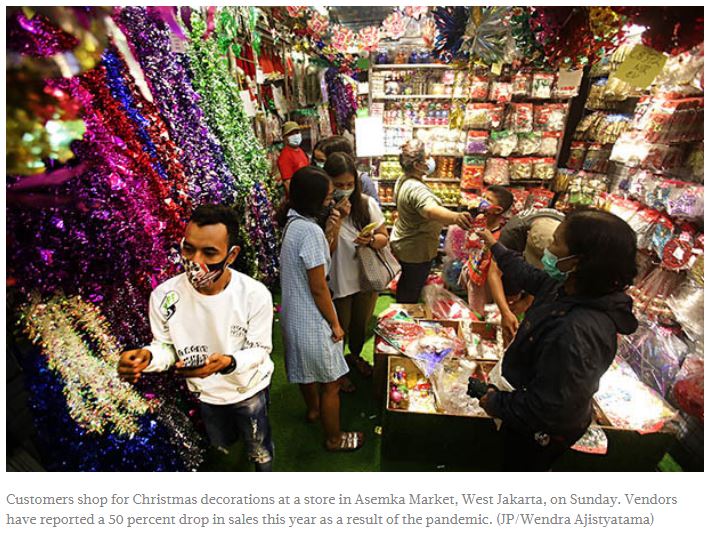Slow recovery could damage Indonesia’s credit rating, Moody’s warns
Credit ratings agency Moody’s Investors Service has warned that Indonesia’s credit rating could be downgraded next year if there is a prolonged economic slowdown, a weakening policy framework or a deteriorating external position.
“The trigger for a [potential] ratings downgrade is coming from long-term stagnation in growth that could last beyond 2020 and 2021,” said senior Moody’s analyst Anushka Shah at a media briefing on Tuesday.
“In the absence of either an upturn in consumption or investment growth, government spending will actually remain the main factor driving headline GDP [gross domestic product].”
The ratings agency expects Indonesia’s economy to contract by 2 percent this year, followed by a 4.7 percent rebound over the course of 2021.
However, Shah said, actual growth would depend on the government’s pandemic management and the magnitude of government spending, among other factors.
Indonesia fell into recession for the first time in two decades this year as the COVID-19 pandemic, and the social restrictions that followed, took a great toll on economic activity.
As the country’s GDP fell by 3.49 percent annually in the third quarter, household spending, which accounts for more than half of GDP, fell 4.04 percent year-on-year, Statistics Indonesia (BPS) data shows.
Although Indonesia’s growth forecast remained stable at 5 to 6 percent, Shah said, the country’s productivity growth had been stagnating. She believed the recently passed Job Creation Law was crucial to revive investment, which would help boost productivity.
The controversial jobs law, which altered more than 79 laws and eliminated thousands of regulations, seeks to cut bureaucratic red tape, ease licensing requirements and relax labor regulations, among other measures to attract investment and create jobs.
The ratings agency gave Indonesia a Baa2 rating, one notch above the lowest investment grade, with a stable outlook.
However, Shah said, the rating could be downgraded in the case of shocks to the country’s external position or if there was any evidence that the country’s policy framework and institutions had weakened.
“Pandemic management is one aspect, but in general, broader institutional management is a very important aspect of the overall rating,” she said.
Indonesia is struggling to get a grip on the coronavirus outbreak. It had recorded more than 629,400 cumulative infections as of Tuesday, the most in Southeast Asia, with at least 19,000 fatalities, according to official data.
Shah said the government’s efforts to significantly raise state revenue could support the country’s credit rating, adding that higher economic growth potential driven by greater competitiveness and a deepening of financial markets could also trigger a credit rating upgrade.
The government has prepared a Rp 695.2 trillion (US$49.4 billion) fiscal stimulus package to support the economy. As a result, it expects the budget deficit to reach 6.34 percent of GDP, more than twice the initial ceiling of 3 percent, and expects the debt to GDP ratio to reach 37 percent this year, up from about 30 percent last year.
Moody’s expect the country’s debt to reach 40 percent of GDP by the end of next year.
The government has taken measures to boost state revenue over the past few weeks, including by increasing cigarette excise taxes by an average of 12.5 percent in February of next year and imposing higher export levies on crude palm oil (CPO).
Finance Minister Sri Mulyani Indrawati said recently that the government might pursue a plan to tax technology firms on the income they generated from the country even if the Organization for Economic Cooperation and Development (OECD) did not reach a consensus on digital tax.
“Of course, we hope for a global taxation agreement. It would be so much better as it gives certainty,” the minister said as reported by Kontan. “But it does not mean we cannot collect the taxes. The difference is we will not be doing something that is based on a formula advocated by the OECD.”
The finance minister said on Monday that the economy was likely to recover further going forward, adding that the country would need to balance pandemic containment and the economy.
“Indonesia should continue economic recovery progress if economic activity can be conducted without worsening the virus outbreak,” Sri Mulyani said.
Source: https://www.thejakartapost.com/news/2020/12/16/slow-recovery-could-damage-indonesias-credit-rating-moodys-warns.html


 Thailand
Thailand




